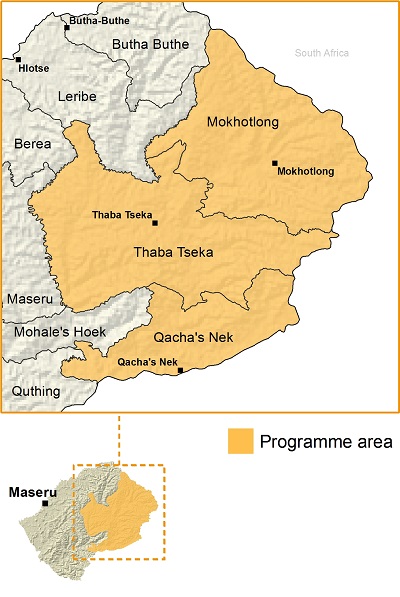Sustainable Agricultural Development Programme for the Mountain Areas
IFAD Asset Request Portlet
Agrégateur de contenus
Sustainable Agricultural Development Programme for the Mountain Areas
Sustainable Agricultural Development Programme for the Mountain Areas
The three mountain districts of Mokhotlong, Qacha’s Nek and Thaba Tseka cover more than a third of the country’s land area. Population density is low and people are widely scattered in remote villages. Much of the programme area is covered by rangelands where the majority of Lesotho’s livestock is raised. During the winter most of the rangelands are inaccessible, and the animals may suffer as a result of severe shortages of feed.
About 80 per cent of the households in the area cannot produce enough to feed themselves more than six months out of the year. Four out of ten children are stunted. The area lags behind the national average in terms of key social indicators such as clean water, sanitation and accessibility and level of education.
Up to 40 per cent of the households are headed by women, many of them sharecroppers. All households have backyard gardens where families could increase production by intensive farming and horticulture. Programme activities focus on farming households that receive few or no remittances from migrant members, on households headed by women, and on landless people.
The programme is an integral part of the country’s Agricultural Sector Investment Programme (ASIP), and it has the objective of improving agricultural productivity by delivering core agriculture support services that farmers need to improve household food security and nutrition. It also promotes participation in planning and implementation and strengthens the institutional capacity of district administrations. Through activities such as village workshops, it has broadened and deepened the scope and coverage of the community planning process.
To achieve its aims, the programme supports:
- effective and efficient delivery of agricultural support services
- participation by local people in planning and implementation of the programme
- the building of local institutional capacity at the district level and among community-based organizations
To increase household incomes, the programme invests in:
- crop diversification, promoting backyard gardens, low-cost weed and pest control packages and on-farm training, as well as the Machobane farming system
- improved livestock production, through better animal health and nutrition, and better quality of wool, mohair and meat
- improved range management, including rehabilitation of pastures and formation of grazing associations
The programme has assisted the government in reviewing and improving existing financial accounting and budgetary systems to enhance accountability and monitoring at the district level.
Source: IFAD
